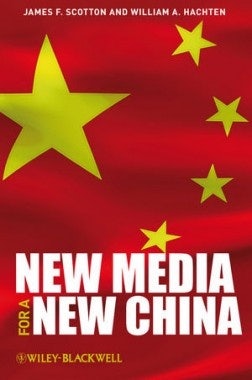New Media for a New China (Wiley-Blackwell, March 2010, $39.95 Paperback), Edited By James F. Scotton and William A. Hachten#

The Western idea of ‘New Media’ commonly refers to digitized or computerized communication technologies. Rather than looking at these technologies themselves,
New Media for a New China#
, edited by James F. Scotton and William A. Hachten, instead addresses the growth and adaptation of various traditional forms of media to the new sociopolitical environment of China. New Media is discussed as it pertains to China’s media industry, which has struggled to become profitable in the years following the cancellation of subsidies for state-owned television stations, and look the development of industries such as television amid the greatest transformation of the social and political dynamics in recent Chinese history.
The book, intended to be a textbook for students and scholars, introduces anyone interested in the mass media of China to a myriad of facts and data, constructed into fluid chapters. The contributors range from PhD scholars from US universities to Chinese professors and journalism lecturers and Chinese reporters. By including Chinese scholars, the editors achieve a balance of Western and Chinese perspectives to stimulate the ongoing conversation about communication in China and between China and the world.
By providing unique insight and surprising facts about the astonishing growth of media in China (where most segments are maintaining double-digit growth), each chapter works to provide a talking point from which to start a broader discussion. Drawing attention to the 2008 Beijing Olympics or the growth of each medium suggests both questions and answers about each form of media; such as why it has developed as it has, and where it may go from here.
One chapter focuses on the film industry, beginning by comparing the field of independent filmmaking to major box-office films in China, noting that box-office revenues in China amounted to 3.3 billion yuan (US$475 million) in 2007. Carefully mapping out the progression of China’s fifth generation film-makers, Yong Liu, a lecturer at Fudan University, discusses the introduction of bank funding into the Chinese film industry, due to the imperative of star-studded casts for box-office success. Though the industry is no doubt growing, and growing quickly, new films risk running into censorship issues. But as censorship of films has gradually loosened, will China move towards a rating system? How will filmmakers balance artistic and creative ventures with the challenges of funding, rampant piracy, and censorship?
Film is but a small part of China's massive media industry. With its continually growing media channels as well as expansion into mobile and online communication, new media in China has the potential to greatly affect social and political change in the future of China (as we have seen in recent years), but still faces the realities of economic challenges as well as the influence of the Chinese government.
In time, China (and the world) will emerge from the current global recession. The news media will become, if permitted, a more effective agent for stability as well as change if political and social changes arrive in the Middle Kingdom. Greater autonomy for the media will make possible more and meaningful debates about public issues and opportunities to discuss politics. For that to happen, the Chinese people must able to elect their own public officials and to enjoy an honest and even-handed judicial system, in effect to establish the rule of law.
The crux of China’s deep problem concerning press freedom and freedom of expression was well stated by Xin Xin who wrote: “China’s media are regulated mainly by administrative order, rather than by a well-established legal system. China does not have media law. This enables the central government to change policy and regulation more flexibly. (212)"
New Media For a New China#
is available for purchase on the Wiley-Blackwell website or on Amazon.com.